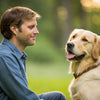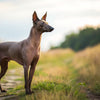Understanding Shiba Inu Temperament: The Good, The Challenging, and the Unique
- Houndsy
Table of Contents
- Introduction
- The Unique Personality of the Shiba Inu
- Training and Socialization: Key to a Happy Shiba
- Living with a Shiba Inu: What to Expect
- The Bond Between Shiba Inus and Their Owners
- Conclusion
- FAQ
Introduction
Imagine a small dog with a fox-like appearance, an independent spirit, and a personality that can be both charming and challenging. This is the Shiba Inu, a breed renowned for its unique temperament and captivating charm. Did you know that the Shiba Inu was originally bred for hunting in Japan, making it one of the oldest and most revered dog breeds? As pet owners, understanding the temperament of our furry companions is crucial for fostering a harmonious relationship. In this blog post, we will delve into the multifaceted temperament of the Shiba Inu, exploring their traits, behaviors, and what makes them a beloved choice for many dog lovers.
By the end of this article, you will gain insight into the Shiba Inu temperament, including their intelligence, independence, and strong-willed nature. We will also discuss how to best care for a Shiba Inu, including training tips and lifestyle adjustments that can help you thrive as a pet parent. So, whether you are already a proud Shiba Inu owner or considering welcoming one into your home, let’s embark on this journey together.
The Unique Personality of the Shiba Inu
The Shiba Inu is often described as a "big dog in a small dog's body." They possess a spirited boldness, affectionately known as "kan'i" in Japanese, which embodies their confident demeanor. Their loyalty, intelligence, and independence set them apart from other breeds, making them a popular choice among experienced dog owners. Here are some essential aspects of the Shiba Inu's personality:
1. Confident and Independent
Shiba Inus are known for their self-reliant nature. They do not crave constant attention, which is a significant departure from many other breeds that are eager to please. This independence can sometimes be mistaken for aloofness, but it simply means that they enjoy their space and time to explore.
2. Intelligent Yet Stubborn
Renowned for their intelligence, Shiba Inus are quick learners. However, this intelligence comes with a stubborn streak. They may choose to ignore commands if they don't see the value in following them. This trait requires patient and consistent training methods, as they tend to respond better to positive reinforcement.
3. Spirited and Playful
Shiba Inus have a playful side that shines through in their interactions. They enjoy activities that stimulate their mind and body, making regular exercise a necessity. Whether it's chasing a ball or engaging in agility training, keeping them active is key to a happy Shiba Inu.
4. Strong Prey Drive
As a breed originally developed for hunting, Shiba Inus have a strong prey drive. This instinct can lead to chasing small animals, including cats, rabbits, and squirrels. It’s important to manage this behavior through training and supervision, especially in environments where other animals are present.
5. Clean and Fastidious
Shiba Inus are known for their cat-like grooming habits. They are relatively low-shedding and often prefer to keep their living space clean. This fastidious nature can be a delightful aspect of their temperament, making them easier to care for in terms of grooming.
Training and Socialization: Key to a Happy Shiba
Given their unique temperament, training and socialization are crucial for Shiba Inus. Here are some strategies to help you effectively train your Shiba Inu:
1. Start Early
Begin training and socialization as soon as you bring your Shiba Inu home. Early exposure to various environments, people, and experiences will help them develop into well-rounded adults. Puppy classes can be highly beneficial for socialization and learning basic commands.
2. Use Positive Reinforcement
Due to their stubborn nature, positive reinforcement is the most effective training method for Shiba Inus. Treats, praise, and playtime can motivate them to follow commands and engage in desired behaviors. Avoid harsh training methods, as these can create fear and resistance.
3. Be Consistent
Consistency is key when training a Shiba Inu. Establish clear rules and stick to them. If you allow certain behaviors sometimes but not others, it can confuse your dog. Consistency in commands, rewards, and expectations will help your Shiba Inu learn faster.
4. Provide Mental Stimulation
Shiba Inus require mental stimulation to prevent boredom-induced behaviors, such as chewing or digging. Interactive toys, puzzle feeders, and training exercises can keep their minds engaged. Consider incorporating regular practice of tricks and obedience commands into your routine to challenge them.
5. Be Patient
Training a Shiba Inu may take time and patience. If they are unresponsive to commands, take a step back and reassess your approach. Keep training sessions short and positive to maintain their interest and enthusiasm.
Living with a Shiba Inu: What to Expect
Owning a Shiba Inu comes with its set of challenges and rewards. Understanding what to expect will help you navigate life with this spirited breed.
1. Space Requirements
Shiba Inus are adaptable dogs that can live comfortably in both apartments and houses. However, they need daily exercise to expend their energy. Regular walks and playtime are essential, so be prepared to dedicate time to their physical needs.
2. Socialization with Other Pets
While some Shiba Inus can coexist with other pets, their strong prey drive can lead to conflicts, especially with smaller animals. Early socialization and gradual introductions to new pets can help ease tensions. Always supervise interactions until you are confident in their behavior.
3. Grooming Needs
Despite their thick double coat, Shiba Inus are relatively low-maintenance in terms of grooming. Regular brushing helps reduce shedding, especially during seasonal changes. Bathing should only be done when necessary, as frequent baths can strip their coat of natural oils.
4. Health Considerations
Like all breeds, Shiba Inus are prone to certain health issues, including patellar luxation and eye conditions like glaucoma. Regular veterinary check-ups and a healthy diet can help manage their well-being. Investing in pet insurance may also provide peace of mind for unexpected health issues.
5. The “Shiba Scream”
One of the most notorious traits of the Shiba Inu is their vocalization known as the "Shiba scream." This high-pitched sound can occur when they are excited, frustrated, or seeking attention. While it can be amusing, it’s important to understand that excessive vocalization may require additional training to manage.
The Bond Between Shiba Inus and Their Owners
Shiba Inus are known for forming strong bonds with their owners. However, these relationships look different than those with more affectionate breeds. Here are some insights into the bond you can expect with a Shiba Inu:
1. Loyalty and Affection
While Shiba Inus may not be overtly affectionate like some breeds, they are deeply loyal to their families. They often follow their owners around the house and enjoy spending time in their company. Their love is shown through loyalty rather than overt displays of affection.
2. Understanding Their Quirks
Recognizing and accepting the unique quirks of your Shiba Inu is essential for a harmonious relationship. Their independent nature and occasional aloofness can be misinterpreted as disinterest. Understanding their personality helps foster a deeper connection.
3. Engaging in Activities Together
Shiba Inus thrive in environments where they can participate in activities with their owners. Whether it’s hiking, agility training, or simply playing fetch, engaging in fun activities strengthens your bond and keeps them mentally stimulated.
4. Respecting Their Space
Shiba Inus enjoy their independence and may need time alone. Respecting their need for personal space will help them feel secure and valued. Encourage them to retreat to their designated area when they need downtime.
5. Building Trust Through Consistency
As previously mentioned, consistency in training and interactions builds trust between you and your Shiba Inu. When they feel secure in their environment and understand what is expected of them, they are more likely to thrive.
Conclusion
The temperament of a Shiba Inu is a delightful blend of independence, intelligence, and spirited energy. Understanding their unique traits and behaviors is essential for fostering a strong, loving relationship. These remarkable dogs are not for everyone, but for those who appreciate their independent nature and are willing to invest time in training and socialization, a Shiba Inu can be a loyal and fulfilling companion.
As we navigate the joys and challenges of pet ownership, remember that the right tools can make a significant difference in the experience. The Houndsy Kibble Dispenser, for instance, is designed to simplify and elevate the daily feeding ritual for our furry friends. With its ergonomic convenience and mid-century modern design, it not only ensures that your Shiba Inu receives the right portions but also complements your home decor beautifully.
If you’re ready to enhance your pet care experience, consider exploring the Houndsy Kibble Dispenser today.
FAQ
1. Are Shiba Inus good family dogs? While Shiba Inus can be loyal and loving companions, they may not be the best choice for families with young children due to their independent nature and potential for possessiveness. Supervision is crucial during interactions.
2. How much exercise do Shiba Inus need? Shiba Inus require daily exercise, ideally around 30 minutes to an hour. Activities like walks, playtime, and mental stimulation are essential to keep them happy and healthy.
3. Do Shiba Inus get along with other pets? Shiba Inus can be territorial and have a strong prey drive, which may lead to conflicts with smaller animals. Early socialization and gradual introductions can help, but supervision is necessary.
4. How do I train my Shiba Inu? Training a Shiba Inu requires patience and consistency. Positive reinforcement methods work best, and early socialization is essential for developing good behavior.
5. What health issues are common in Shiba Inus? Shiba Inus may be prone to certain conditions, including patellar luxation, eye diseases, and skin allergies. Regular veterinary check-ups and a healthy diet can help manage these risks.









